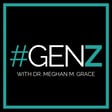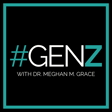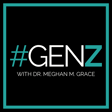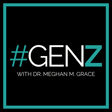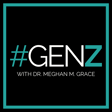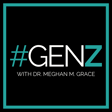Become a Creator today!Start creating today - Share your story with the world!
Start for free
00:00:00
00:00:01

Measuring Cohort Culture - Part 2
Measuring cohort culture is no small feat, which is why we need multiple minds working to build greater knowledge. In part 2 of Measuring Cohort Culture, Tyler Mitic, the CEO and founder of Teen View, shares about his work in developing a community of Gen Zers to help companies and organizations gain insights into the world of Generation Z.
Recommended
Transcript
Introduction to Episode 41
00:00:00
Speaker
Welcome to hashtag Gen Z. I'm your host, Megan Grace.
00:00:18
Speaker
Hello and welcome back. This is episode 41 of hashtag Gen Z. If you tuned in last episode, we reconnected with our friend Andrew Roth, founder and CEO of DCDX, a research insights and strategy firm helping brands truly understand Gen Z.
00:00:34
Speaker
Since we chatted with Andrew, DCDX has put out their Top Gen Z Brands report, so you'll definitely want to go
Quantifying Gen Z Culture
00:00:40
Speaker
check that out. Again, you can find them on their website, DCDX.co and on Instagram and LinkedIn. While I didn't intend to have a two-part focus on measuring cohort culture, I was recently connected with someone else who is working to quantify and measure cohort culture.
00:00:57
Speaker
As I've been on this journey to understand Gen Z culture for a number of years now, I've come to realize it's impossible for one researcher or one research group to be able to cover everything for an entire generation. There's also beauty in multiple minds working together to better understand a cohort.
00:01:12
Speaker
It allows us to look at different topics and from different angles. Similar to how our approach to research from Gen Z differs from Andrew and DCDXs, my guest in this episode is working to measure Gen Z culture, but doing so through a different approach. In this episode, I spend time with Tyler Mydick. Tyler Mydick is the CEO and founder of TeamView, a Silicon Valley-based business that helps companies get insights into the world of Gen Z. Tyler is 16 years old and leads TeamView while also attending Menlo High School
00:01:41
Speaker
in Atherton, California, where he's a junior. Tyler started TeamView two years ago after witnessing adults struggle to understand and to connect with Gen Z ideas, habits, and preferences. Since then, TeamView has worked with clients ranging from Fortune 500 companies to startups and nonprofits. Tyler loves problem solving and tackling new challenges and brings a youthful yet strategic perspective to his work at TeamView. Please help me in welcoming Tyler to this episode.
00:02:14
Speaker
So I'm so excited again. I'm excited every guest, honestly. I guess I shouldn't, it's not that I want to stop saying I'm excited, but I am. I love being able to chat with people that either think similarly or think differently than I do. And in this case, I'm excited to welcome a guest who probably loves data and information as much as I do, which apparently there's more of me out there than I thought.
Origins of TeamView
00:02:35
Speaker
But Tyler, you're joining us from TeenView. I'm going to let you actually explain probably in more authentic words than my own.
00:02:43
Speaker
who you are and what team you does, but welcome to the podcast, Tyler. How are you? I'm doing great. Thanks so much for having me. Really excited to be here and talk a little bit about Gen Z with you.
00:02:56
Speaker
Yeah, so yeah, a little bit about me. I'm 16 years old. I'm based in Silicon Valley. I'm a junior in high school. I'm also the CEO and founder of TeenView, a company I started around two years back. Kind of the origin story is I heard two adults talking about how they,
00:03:21
Speaker
They were having such a hard time reaching Gen Z. They had a Gen Z oriented app. And the way they would actually reach Gen Z was by going to colleges and standing in college microwave lines and offering people $5 to download their app and tell them what they thought.
00:03:36
Speaker
I heard that story. I was like, there has to be a better way. And so I got a couple of friends together and we decided to start consulting for businesses and that grew over time. And now we have a large community of tens of thousands of teens that help companies with everything from
00:03:56
Speaker
I mean, quantitative work and market research and qualitative focus groups, project deep dives. And we're kind of expanding into social media management right now too, which is super exciting and working on some TikTok social media management and Discord social media management.
00:04:16
Speaker
Yeah, the basics of TeamView are really easy. We help old people understand young people. So said in a different way, our clients are typically kind of large to medium sized businesses. And they come to us to get a better understanding of how Gen Z thinks and acts. And so yeah, they asked for understanding social media, talking, talking and thinking through products, developing customer acquisition strategies.
00:04:43
Speaker
I love that you, again, we do different things, but we do a lot of similar things. I watch out how you say old, Tyler, but
TeamView's Methodology and Tools
00:04:53
Speaker
yes, you do a very similar work in what I do in trying to help other generations understand other generations without throwing around any of that age slander that you put out there. I did have like a moment of existential crisis as you were talking. You're like, old people, young people, oh my God, I am the old people now, I think.
00:05:11
Speaker
because it's a little bit about what I do as well and trying to understand what's going on with the teens. Y'all are amazing but terrifying and intimidating at the same time. I don't know if that is just Gen Z or all teenagers, but I'm glad to have you here to be a friendly representative of your peers today. Really what inspired you? I know that you
00:05:33
Speaker
had that conversation where you heard these people trying to engage Gen Z. What was really that moment where you're like, I could do this, and I think we're going to do it through data? Walk me through really what that inspiration looked like. I know you said you collaborated with a friend or two to get started. Walk us through those early days of TeamView and how you've gotten to where you are today.
00:05:56
Speaker
Totally. So I founded TeamView when I was 14 and it was a really interesting experience for me because I always thought about starting a business but you never really think you can do it when you're 14. You don't know what to do.
00:06:17
Speaker
And so, I mean, where I started was I literally went to school and I pitched this idea to friends and I didn't know what I was pitching. I was like, hey, do you guys want to provide your thoughts to companies and get paid? And they're like, sure.
00:06:35
Speaker
And so I started by leveraging my network and the people around me, which was really helpful. And we did some pro bono work with nonprofits and kind of slowly worked our way up. And at the start, we actually did not take the quantitative data route. We took more of a qualitative focus group type route.
00:07:01
Speaker
where me and my friends would sit down with companies and do deep dives on their products and provide reports. Once we got traction there, we realized that there was an area for us to expand.
00:07:16
Speaker
And so we thought through all the different ways we could reach Gen Z and get quantitative data. And we did something that none of our competitors were doing or are doing now. We actually used the Discord platform to try to reach teens. We created a Discord community, which I don't know, have you ever used Discord?
00:07:40
Speaker
I'm not as familiar with Discord with love. I mean, I know that it's like a messaging setting, I believe. I'm showing my age and lack of knowledge, but that is humility and vulnerability at its finest. No, walk us through Discord and make us all fans.
00:07:57
Speaker
Yeah, so it's a bunch of kind of little communities and servers. And it started as a place for gaming. But it's actually kind of expanded a bunch in the past couple of years. And now it's kind of a bunch of different communities for all sorts of things. And I almost look at it as like the central place for Gen Z communities.
00:08:21
Speaker
And so we created our own community there. We created our own server. And by kind of reaching teens where they were at, we were able to get much more long-term engagement and much more high-value engagement. And that's been super successful for us, and we've continued to kind of grow that server over these past couple of years. So it's almost like a little bit like Reddit. Does it have a Reddit vibe to it?
00:08:51
Speaker
Yeah, it's pretty kind of familiar. Yeah, it's pretty similar to Reddit. Yeah, in kind of the same room terms. The way I would almost think about it is Slack for teens. So it has the same kind of channel set up. It has the same messaging set up. You can also kind of bring in bots and third party integrations.
00:09:18
Speaker
But it's a much more user friendly, at least for Gen Z version of Slack. Got it. So I could definitely see how, especially with where we know teenagers are hanging out in terms of gaming methodology and just engagement through gaming and those settings, I could definitely see how this is a prime environment where people of your, I don't want to say target audience, but really if you were trying to connect with your peers,
00:09:48
Speaker
to get their voice on things. This makes absolute sense to me as to why you would go there. And I do think that's unique and it's also creative. I work in social science research and sometimes you just got to go to the place where your target audience is. In this place it's a digital setting where teenagers are gathering.
00:10:05
Speaker
Um, it's kind of like, you know, how you mentioned that those app developers were going to college, uh, microwaving lines. Um, back in my old timey days, we just hung out at the mall. So like, if you wanted to find teenagers, you just went to the mall or Target or in my small hometown, the Sonic parking lot. Uh, that's where they would have found me and my friends. But yeah, I think it's, it's really interesting how you're taking that same mindset of social science research and applying it to just a new environment of where people are at. I think that's so cool.
00:10:35
Speaker
So I know you said that you do some of that engagement through Discord. Walk us through some of your methods. I know you mentioned a few of them at the beginning that it really started with what we academic nerds would call document analysis or potentially product analysis that you were giving feedback there.
Gen Z Insights and Expansion
00:10:50
Speaker
But what are some of the other methods that you utilize within TeamView to capture the TeamView?
00:10:57
Speaker
Yeah, so one method that we've been using a lot recently in which our clients have loved is something we're calling TeamView Chat, which was kind of inspired from our clients wanted long-term engagement with a small group of teens, and they wanted rapid feedback. And so we were like, in the simplest form, what's our solution to that?
00:11:24
Speaker
We decided to throw a bunch of teens in a group chat with adults. It was actually way more successful than you would think. It's something that seems obvious, but we did it with design teams for companies, and companies were able to get instant feedback as they were working on their UI and UX. We did it as companies were working on
00:11:47
Speaker
on product teams were working on adding new features to their apps and to their websites. And yeah, they were also able to kind of get instant feedback and we were able to kind of aggregate this great group of teams on the other side that was super intellectual and was able to provide, like, yeah, they were the trendsetters of Gen Z. And by kind of capturing that group, we were able to have a smaller group of intellectual teams kind of represent a larger group.
00:12:19
Speaker
So I know that you've really focused on your, I would say that high school, maybe some pre-teen middle school age. Do you ever envision that you will go to an older population or a younger population thinking about like college and young adults or even your elementary school children? I know elementary school children are technically at this point, gen alpha, but with that model, are you kind of trying to stay within what I'd imagine is like the eight
00:12:47
Speaker
grade to 12th grade range or where do you see it going, if anywhere?
00:12:53
Speaker
Yeah, so we've had a lot of requests for clients. We commonly see, so we specialize 13 to 19 is what we consider to be a teen. But we've realized that a lot of clients have been requesting the upper range of 19 and above 19, which fits into Gen Z and going all the way up to around 24. I'm not totally sure what the number is these days.
00:13:18
Speaker
Yeah, we've definitely considered and we've taken projects and done work with clients that does push that boundary. We're generally pretty flexible. We have not gone younger though, because the challenge is a lot of the forms that we're using to reach Gen Z, like these social media platforms are kind of all 13 plus. And as we kind of get below that barrier, we run into other issues.
00:13:40
Speaker
But yeah, we've actually, we've seen, I mean, I feel as if platforms like Discord are kind of slowly getting an older age demographic as kind of people continue to use the platform as they get older. And with that, we're also kind of changing.
00:13:55
Speaker
And also I'm getting older too. And the company is definitely kind of moving with me. And as I get older, I see kind of the value in reaching kind of the higher end of Gen Z. And so yeah, it's definitely something we're working on.
00:14:12
Speaker
Yeah. So I think it'll be interesting because I think that what you're doing is really important because, um, from a teenage perspective, that is an area, again, like I said, teenagers are intimidating, um, like in a good way. Um, I actually recorded an episode with, uh, someone that I really want to connect you with Andrew Roth. Uh, y'all do very similar work. Um, and we talked about how like teenage girls really are the gatekeepers to culture. Like those young people really, really are in charge of what's cool.
00:14:41
Speaker
That's a very intimidating place to be. I don't ever feel like I was a cool teenage girl, but somebody was at my high school. I think it's important that there's some of this peer-ledness that goes on.
00:14:55
Speaker
with what you're doing, but I do think that, yes, you will get older. That's the inevitability of being a human, I apologize. But it's really important that there is still that space for teenagers to kind of gather. So I'm really curious to follow your journey with this as it continues, whether you continue it as you move on past being a teenager, you hand it off to somebody else. But I do think it's really important that you're creating that space and you're creating that environment for people to provide feedback and be a part of really important
00:15:24
Speaker
conversations, make sure those voices are heard. So as you know, this season is about culture and culture is a really interesting thing. In the sense, a lot of people think that it's just maybe our race or ethnicity or our gender, but our age is actually a component of our culture too. And I know that that is like preaching to the choir to you that there is a culture that exists within your cohort of friends and peers. You've really talked to us a bit about what
00:15:54
Speaker
is that you do to kind of help capture that voice and that part of culture but what do you think from your work what do you think are some things that we need to know about Gen Z culture and like Gen Z cohort culture when we think about the values and behaviors we're the old people what are the things we need to know
00:16:14
Speaker
Yeah, totally.
Role of TikTok and Trends
00:16:15
Speaker
We've been talking about Discord, which is kind of the place for communities in Gen Z. But the big place for culture and for, yeah, to kind of capture the energy of Gen Z and where companies can go to market to Gen Z is TikTok, which is also, I've heard, kind of intimidating for, I don't know, to call you guys the people on the older end.
00:16:37
Speaker
You can say it. It's fine. Old people. But yeah, TikTok is kind of an app that's largely populated by Gen Z and plays a big role in kind of
00:16:50
Speaker
in cultivating the Gen Z culture. I mean, when you kind of look at TikTok trends these days, they're these crazy things. I don't know if you've seen, but recently Gen Z has been dressing up in suits to go to minion movies. There's also been other trends, like all of Gen Z decides to replace the laughing emoji with the chair emoji.
00:17:13
Speaker
And what all these things do, which is really interesting, is they really kind of create this hive mind almost, but this kind of like-mindedness and this interconnectedness that's happening through the internet, through all Gen Z. And more than any other generation before, it creates this bond that makes us all feel super close
00:17:41
Speaker
And makes us all feel like we have something in common Yeah, and it's all kind of happened through these these social media apps that that Gen Z has has kind of taken over Yes, I'm terrified of tick-tock I might just I might have to contract you at an hourly rate to like just coach me through these things to be less scared
00:18:05
Speaker
Um, I shouldn't be scared of these things, but it is, um, and, and this is not the first time I've heard about this that, you know, the trends are whipping through fast, but it is like at a week by week basis. I can't understand how that does matter and why it matters to Gen Z culture is that.
00:18:25
Speaker
being a part of the trend is not necessarily something that's unique and new to Gen Z, but in a world where we are so sometimes distant by physical distance, we are connected in other ways. And that's a really cool thing that social media gives to you all is that, you know, if you do the minion suit trend or whatever it is,
00:18:46
Speaker
that you're connected from you being in Silicon Valley all the way to a kid in Pensacola, Florida. We all went and did our minion suits. We did that. That's so cool. That's good for Gen Z. Way to have it. I know some of you, older Gen Z, people will be like, well, what about the Tide Pods? I think they learned the lessons on the challenges. And we're not doing the Tide Pods anymore. We're just doing harmless going to the movie theaters in our suits kind of situation.
00:19:12
Speaker
I think that's a really cool thing to have. It's almost like you get to have senior ditch day every day on TikTok, but you're still going to school, which is important. You're not even a senior yet. You won't even get the joys of senior ditch day for another year and a half, two years.
00:19:27
Speaker
You'll get there, but not TikToks there to emulate that same connectedness in that spirit. I think that's an important part of culture, sharing kind of also some of the humor. You go, it's funny. People are like, what's funny to Gen Z? I'm like, I don't know. I wish I could tell you it changes so fast.
00:19:42
Speaker
I think that there is that shared experience, that shared humor, that shared, this is what's going on. This is the funny joke. This is the trend. This is the meme. People will criticize that. Older generations and other generations will criticize that. But I think that's so important. And we forget that as we're growing up, every generation has that same thing. So I can look back to my time when I was around your age and know exactly like
00:20:06
Speaker
what were the things that were cool that you had to like, or you might as well not be a part of like the youth culture, which is, it's not as stringent. But anyways, let's think about, I know you talked about what we need to know about Gen Z culture, where we should go if we wanted to be a part of it.
00:20:27
Speaker
Um, or be scared of it if you're like me. Um, but what is something or some things that are potentially misunderstood about Gen Z culture? So I know you, um, you shared about things we should know and where's places we can go to learn, but what is something that you think is misunderstood? Cause I'm sure you get that in the work that you do with the clients that you work with.
00:20:48
Speaker
Yeah, for sure.
Engagement and Misconceptions
00:20:51
Speaker
So people very commonly think Gen Z has short attention spans, which to some extent we do. But I think more of that is just due to we want to cut through the BS. If you want to seriously get the attention of Gen Z, you have to provide some sort of value to us and make us want to be involved.
00:21:13
Speaker
I mean, I think the best way kind of like outsiders, outside brands, people trying to reach Gen Z can get our attention is to kind of become part of our community and to show us that you care. I think gone are the days when brands can make like 30-second videos or kind of quick ads that are interesting, but like
00:21:37
Speaker
aren't really that powerful and actually get people's attention and get Gen Z excited. We constantly have our eyes out for fake stuff. And if you really want to reach us, you have to be genuine. Yeah, that's definitely something that I see people commonly misunderstand or just don't really get.
00:22:03
Speaker
I think that if I think about the takeaway there is that Gen Z just wants to be included sometimes.
00:22:11
Speaker
if that makes sense, welcomed and included into whatever space it is. I don't know if there's a necessity that they have to be in charge of everything, but I've just personally found, and please correct me if I'm wrong, that if I so much as open up the opportunity to be provided with feedback or to say, hey, Tyler, I've been working on this thing.
00:22:34
Speaker
but I would love to get your perspective on it. Or do you wanna come help me co-create it? Or do you wanna just like be a part of the conversation? There is such a willingness to do that. And I think that's where we actually have a better opportunity to not have misunderstandings is just thinking like if we're creating something for or if we're thinking about creating a way to engage, like we just need to ask Gen Z and they'll probably wanna be a part of it. Then there's this ownership, this ambassadorship. Am I correct in like kind of hearing that?
00:23:05
Speaker
Yeah, totally. Yeah, people want to be engaging. Yeah, and a lot of brands are doing that really well right now through platforms like Discord, like we were talking about before. I mean, you see like Starbucks creating Discord servers and Olympics creating a Discord server. And you see a lot of these brands asking Gen Z for their feedback,
00:23:31
Speaker
for getting them engaged in the product, which is something that we haven't really seen before on this scale. But yeah, it definitely makes Gen Z feel included. And then the next time Gen Z's looking for a coffee shop, they're like, oh, well, Starbucks, I was just in their Discord server. And they get lots of new customers there.
00:23:54
Speaker
Yeah, I think that's really interesting. And it's almost like not brand feedback, but I know that I always take surveys because I believe in survey karma. But even in just small things, like what do you like? What do you not like? In a very casual sense, it gives you this almost element of, I feel like I contributed. I always take the feedback of my airlines when I fly because
00:24:17
Speaker
if I have any opportunity to indicate that the service or the experience could get better for myself and other people, then of course I'm gonna do it because I'm gonna have a better flight, right? And so I think that there is this willingness from Gen Z to share and be a part of it if we open the door and let that even be an opportunity. I think that's a really important one.
00:24:37
Speaker
Well, Tyler, this has been really a lovely conversation. I just absolutely love what you're doing to engage your peers, really capture kind of the voice and views of what's going on with people your age. That's an important charge to be leading. So I wrap up every episode and every interview with the same question. And I think it's really important. But what is your favorite thing about your Gen Z peers? Yeah, it's a great question.
Gen Z Humor and Reflection
00:25:05
Speaker
And it's so hard because it really is, yeah, lots of things to choose from. But I think if I had to single out one thing, I would say it's our humor. We were talking about this a little bit before, but Gen Z kind of through our humor, we celebrate the good parts and the bad parts of our generation.
00:25:23
Speaker
And sometimes our humor is like so odd. It doesn't even make sense And part of what we do through our humor is almost like like the fact that it's exclusive a little bit that older generations Don't get it is part of what we love. It's it kind of creates this like it's like teens being rebellious but in a way that
00:25:45
Speaker
Yeah, in a way that obviously it hasn't really happened in the past, and it's done through a really interesting way. I mean, a great example of this is, let's see, a TikTok trend that went totally viral a little while back was people would try to create a unique series of events. And the idea was they would take a Cheerio, then they would just smash it, and then they would put something on top of it. And the concept would be, I did something that nobody else did before.
00:26:15
Speaker
And then all throughout the comments of that TikTok video would be people saying, well, you should have seen Uncle Joe at the potluck last Sunday. He did that exact thing. And yeah, it's this really odd thing.
00:26:32
Speaker
But funny type of humor that creates such an amazing community. It's so amazing to be part of all this and see it all unfolding and to see how Gen Z uses the internet and uses all these platforms to create such a lively and engaging and fun community.
00:26:58
Speaker
Yes, I might need a tutorial on Gen Z humor as well, if one could quantify that for me. I have read somewhere that Gen Z is like big fans of John Mulaney, like the comedian. Um, I don't know if that's true or false because his comedy style is like, he's older than I am. So I'm like, how did he crack the code with them?
00:27:16
Speaker
But his comedy style is very like you just own up to like the good and the bad about you and you can you can be serious and acknowledge the human experience but you can also poke fun at the good and the bad parts. So I think that that's probably why they tend to love him.
00:27:34
Speaker
because he is very good at poking the good and the bad parts of life with a little bit of a joke here and there.
Conclusion and Farewell
00:27:42
Speaker
Well, Tyler, thank you so much. Per usual, it has been just a delight to spend time with you. I am semi-serious that I probably might just need to be like, Tyler, tell me about offline all of these things because I realize as I get older, so does Gen Z, but also there's also some young ones and there's a whole other world out there of the
00:28:03
Speaker
younger Gen Z that are using different platforms and different spaces and older Gen Z and that in itself. I had moments of dissonance in our conversation in a very good way that there's still so much for myself to learn. So I want to thank you for your willingness to share with this old gal a little bit about what's going on with the young people. And I definitely learned quite a bit about some new spaces that y'all are inhabiting.
00:28:26
Speaker
and new ways in which you're engaging and sharing community and how your work with TeamView is doing a great job in trying to capture what that culture is and capture what that experience is. So thank you so much for being here. Yeah, thanks so much. It's been great sharing all of that and I really enjoyed this. Thanks for having me.
00:28:42
Speaker
I want to thank Tyler for spending time with me and sharing about his work. It's incredible to see young people not only develop a passion for advocating for their generation, but working to develop research-backed insights and helping others understand their generation. As I shared in the beginning of this episode, it's nearly impossible for one researcher or one research firm to cover and uncover everything for a cohort.
00:29:04
Speaker
I'm so glad there are people like Tyler and Andrew who are also working in this space to help create a world that better understands and better engages Gen Z. You can find more information about Tyler and his work with TeamView at TeamView.com. Before we wrap up this episode, I want to remind you of recent changes for Corey and I.
00:29:22
Speaker
What used to be known as the Gen Z Hub is now the Institute for Generational Research and Education. This newly established nonprofit will be co-led by myself and Dr. Corey C. Miller. Our mission is to foster understanding, appreciation, and collaboration between generations through providing research and knowledge dissemination about generational characteristics, trends, behaviors, and outlooks as they impact intergenerational engagement.
00:29:47
Speaker
You can learn more about our work and check out our new website, Institute4Gens.org. That is Institute4Gens.org. And thank you for tuning into this episode. As always, if you enjoy this episode, please rate, review, and subscribe wherever you listen to podcasts. This not only helps me improve the podcast, but it helps other listeners find the show.
00:30:09
Speaker
Stay tuned as we continue to explore Gen Z cohort culture in upcoming episodes. However, if there's something you want to learn about, I'll happily make that happen. Please reach out via my website meganmgrace.com or on social media to share any questions or suggestions you have. Thank you again for stopping by for this episode. Let's continue this conversation and we'll chat soon.
